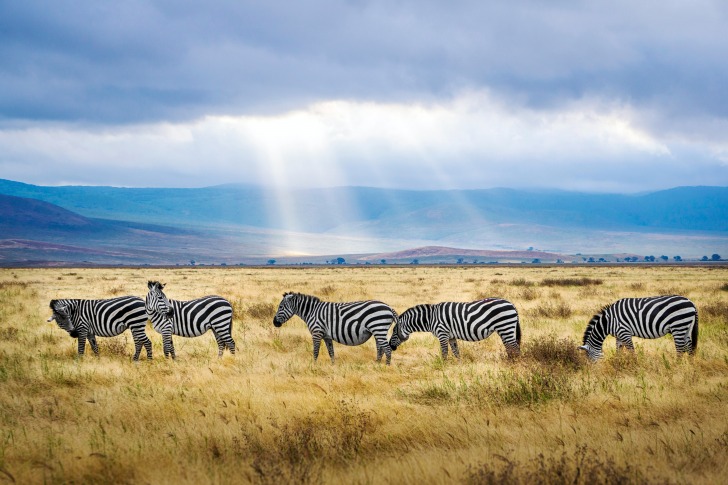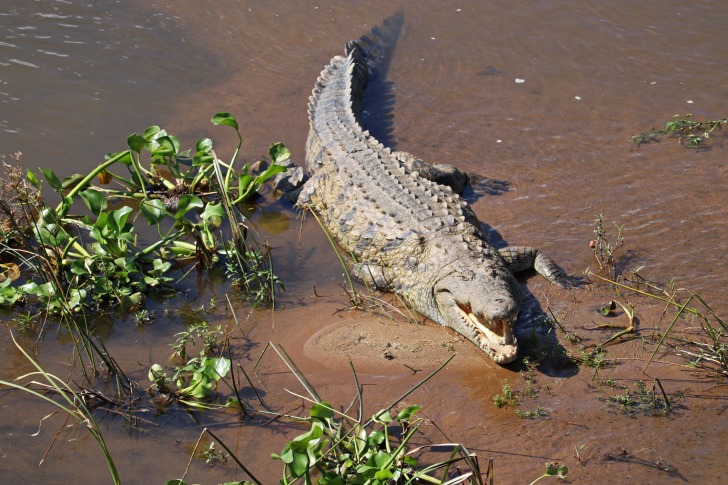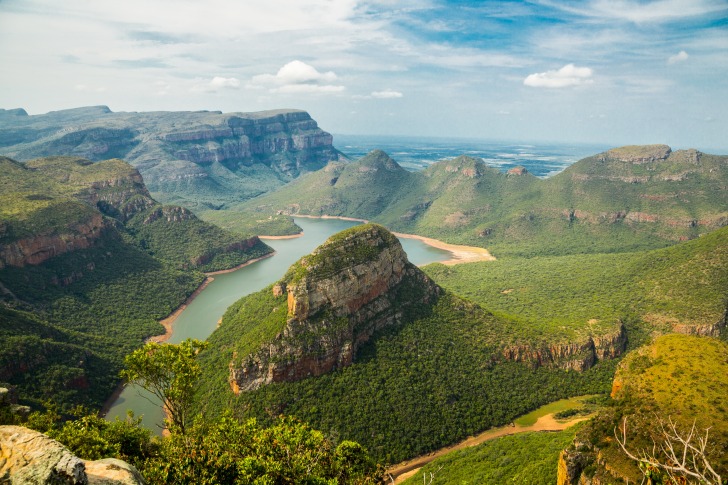When you think about the number of creatures that inhabit Africa, you may be thinking about where alligators live on the continent.
With so many dangerous species roaming the land and in the waters, it’s only natural to believe alligators are in Africa.
You may be aware that alligators can only live in freshwater locations because they don’t contain the glands to excrete salt so saltwater habitats would kill them.
Africa has plenty of lakes on the continent where the alligator could live.
To learn more about alligators in Africa, keep reading.
Contents
So… Are There Alligators in Africa?
You may be surprised to learn that alligators are not found anywhere in Africa!
The only two places on Earth where alligators call home are the United States and China.
This is because Africa has plenty of dangerous crocodiles, such as the Nile Crocodile.
The answer to why alligators can only live in the U.S. and China is not certain, but many experts agree that it has to do with their local environment.
Florida, for instance, is subtropical with a humid climate and heavy rainfall year-round, and alligators need both to survive.

Alligator Species in Africa
New scientific evidence surmises that ancient crocodiles swam to America from Africa.
Since alligators are part of the crocodile family, they likely descended from these African crocodiles.
So while no alligators exist in Africa today, their ancestors probably came from the continent.
Another interesting fact is that in Ancient Egypt, crocodiles were domesticated since they were constantly lurking in the deltas.
Hundreds of mummified crocodiles have been discovered, so there’s a high probability the Ancient Egyptians worshipped them.
Is it Safe to Swim in Africa?
The oceans surrounding the continent are generally safe to swim, with the most popular destinations having lifeguards and other precautioning measures.
However, swimming in remote rivers and lakes across the continent is never advisable.
In addition to the number of fish, animals, and other dangerous creatures you can see, there are also extensive bacteria that, if consumed or enters your body, you can become incredibly ill.
With that being said, plenty of lakes and rivers are safe to swim in, but they are less remote, with scientists and other experts regularly assessing the water and surrounding area for dangers.
Interesting Alligator Facts in Africa
Although no alligators exist in Africa, there are plenty of interesting facts about the species, including:
A recent study determined that wild alligator blood boasts antiviral and antibiotic properties.
Surprisingly, alligator blood can fight against the Herpes simplex virus, West Nile Virus, and HIV-1.
Alligators’ blood features these benefits because it protects them from infection following an injury.
However, their blood has only been studied and not added to human medicines.
Alligators Can Eat Their Young
Although alligators are well known in the Animal Kingdom for caring for and nurturing their young, they also sometimes eat them.
Researchers found that a significant percentage of baby gators die before maturity, and 7% of those deaths are because the parents consume them.
The leading reason is baby alligators within a single litter often have multiple dads.
Therefore, father alligators are a significantly larger threat than mothers to the young because they don’t know which babies are theirs.
Alligators Don’t Hibernate
Alligators don’t hibernate during the winter in the traditional sense.
Instead, they enter a dormancy period that begins with gators using their snouts and feet to dig gator holes.
It’s a tunnel in the mud that can be up to 65 feet long.
The purpose of a gator hole is to protect alligators when it’s too cold or hot for comfort.
During this dormancy period, which lasts around five months, the alligator’s metabolism and heart rates slow drastically.
So while they continue to breathe through the snout, which sticks out of the water, during the coldest months, water will freeze around alligators until the spring thaw.
Chinese Alligators are Endangered
Although the American alligator is prevalent throughout the southeastern U.S., the Chinese alligator isn’t safe.
It’s critically endangered due to habitat degradation, fragmentation, pollution, low productivity, geographic separation, natural disasters, and hunting.
Until the 1990s, the Chinese alligator was hunted extensively.
As a result, it’s estimated that only 300 Chinese alligators are left in the lower Yangtze River.
Some Eat Fruit
The alligator diet consists mainly of meat, but scientists have recently discovered that some alligators purposely eat legumes, seeds, vegetables, and fruit.
In the years before this discovery, seeds found in alligators’ bodies were presumed to be from the animals they had eaten.
Studies further show that alligators help plants distribute seeds around an area from the waste gators leave behind after digestion.
While meat is still the primary ingredient in their diet, younger gators eat small fish, amphibians, and bugs due to their smaller size.
It’s not until they get older that alligators consume mammals, birds, turtles, snakes, fish, and other larger creatures.
The Species Thrives in Slow-Moving Waters
Since all alligators live in freshwater, they prefer slow-moving lakes, swamps, marshes, creeks, and rivers.
Alligators are found in deeper waters during mating season but come to the shoreline to hunt for prey.
American alligators can be found in slow-moving waters from Texas to North Carolina.
The Chinese alligator lives in the lower Yangtze River.
Their Eyes Glow in the Dark
Since alligators’ eyes are on top of their heads so they can lie almost utterly underwater while still monitoring prey and are most active at night, their eyes glow in the dark.
Like cats, alligators feature a structure at the back of their eyes that reflects light for improved night vision.
Therefore, if you shine a flashlight on an alligator’s eyes, they glow red.
The distance between their eyes is a great way to tell the gator’s size.
They Care for their Young
Female alligators care for and look after their babies for around two years after birth.
Part of their duties is to ensure the small gators are protected from predators and well-fed.
Although gators are viewed as ferocious predators, they are also nurturing toward their babies.
With offspring growing around one food per year, they are of decent size, ready to spread their wings from mom.
They’re the Loudest Reptiles on Earth
Females and males emit boisterous roars during mating, which has given them the name the “loudest reptiles in the world.”
Mating calls can reach up to 90 decibels, which is as loud as a lawn mower.
Human vocalizations typically top out at around 70 decibels, so the gator chat is impressively loud.
Males roar to attract female mates and scare off predators.

Alligators vs. Crocodiles
While there are many ways to tell an alligator from a crocodile, here are a few of the major differences:
Body Color
The body color is the simplest way to identify an alligator versus a crocodile.
Alligators are much darker, with black or gray being the norm.
Crocodiles boast a brown or olive green body coloration.
Fresh vs. Salt Water
Another major difference is that alligators will only be found in freshwater, while crocodiles have the glands to live in seawater.
While both species can survive for short periods in either environment, they are physiologically set up for the two different water types.
Head
Alligators feature a head that’s short and wide, while crocodiles have longer and thinner heads.
Jaw Placement
The alligator’s upper jaw is wider than the lower section, with the teeth fitting into small upper jaw cavities.
Crocodiles have almost identical lower and upper jaws, so the teeth in the lower jaw become more apparent if the mouth is closed.
Specifically, look for the gigantic fourth tooth on the lower jaw to determine if it’s a crocodile.
Location
Where you’re located is the easiest way to determine a crocodile versus an alligator.
If you’re anywhere except China or the U.S., you are solely looking at a crocodile.
On the other hand, if you’re in the southeastern part of the U.S., you could be looking at an alligator or crocodile, so you need to follow the rest of these characteristics.
Size
With few exceptions, crocodiles are significantly larger than alligators.
Crocodiles boast an average length of around 12-15 feet, with the most enormous reaching 23 feet and weighing over 1,000 pounds.
On the other hand, alligators average 13 feet and weigh several hundred pounds.
Snout Shape
One of the most straightforward differentiation characteristics is the shape of the snout.
For example, alligators have a “U” shaped snout, while crocodiles feature a “V” shape.
3 Safety Tips for Swimming in Alligator-Infested Waters
While there are many tips for not swimming in alligator-infested water, the most critical include:
- Don’t swim in alligator-infested waters – while it may seem safe and good because alligators fear humans; you never know when one will feel threatened or wander near an alligator nest. This could provoke them to attach.
- Don’t splash around – splashing around signals to the alligator that you could be prey.
- Don’t wear shiny objects – jewelry and other reflective objects can appear like fish scales, thus prompting an alligator to attack.
Alligators are not currently found anywhere in Africa, although plenty of crocodiles loom around.
Since alligators are descents of the croc, which swam to the U.S., alligators likely were in Africa at one point.
In any case, you never want to swim with alligators or crocodiles because they can be dangerous and may attack at any moment.
Frequently Asked Questions
Can alligators sleep underwater?
Alligators often sleep while submerged in water since they can hold their breath for around 20 minutes.
In colder water and weather, alligators can hold their breath for hours.
In either case, alligators sleep with their snouts above water to continue breathing.
This also matches their dormancy during the cold winter months.
How fast can alligators run?
Alligators can run extremely fast, up to 35mph, but only for brief stints.
The fastest person in the world is Usain Bolt who can only top out at 27mph, so it’s incredibly difficult to outrun a gator unless you have a great head start.
Why do alligators keep their mouths open?
Gators are often observed with their heads above water and teeth on display.
While this is an ominous sight, it’s never a sign of aggression.
Instead, they do this to cool down since they sweat through their mouths, like dogs.
Opening their mouths allows for the evaporation of sweat faster so their body temperature can cool down.
Are alligators blind?
Many believe that alligators have poor vision, a common misconception.
They have an exceptionally good range of sight and excellent vision since their eyes are on top of their heads.












As a local, I can confirm that there are no alligators in Africa, but it is important to be cautious when swimming in waters inhabited by crocodiles.